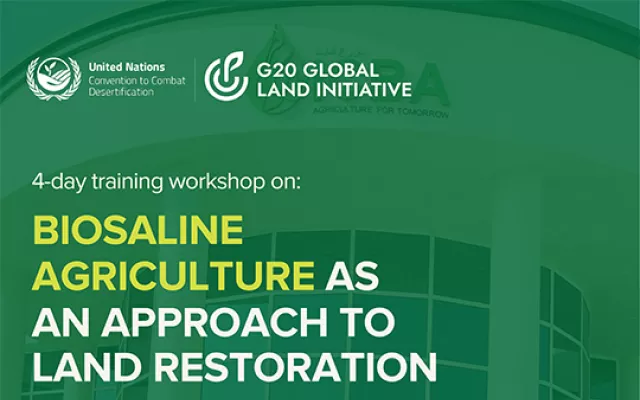Islamic Development Bank president visits ICBA to discuss collaboration
12 February 2018
His Excellency Dr. Bandar Hajjar, President of the Islamic Development Bank (IDB), paid a special visit to the International Center for Biosaline Agriculture (ICBA) on 12 February 2018 to learn about the center’s advances in and contributions to agricultural research and development in different regions, and particularly IDB member countries, and discuss collaboration.
During the visit, Dr. Bandar Hajjar met Professor Abdulrahman Sultan Alsharhan, Chairman of ICBA Board of Directors, and Dr. Ismahane Elouafi, Director General of ICBA, as well the senior management and scientists of the center.
Dr. Bandar Hajjar was briefed about ICBA’s research-for-development initiatives in such areas as aquaculture and bioenergy, climate change adaptation, natural resources management, crop productivity and diversification, and policy analysis.
During the meeting, Dr. Bandar Hajjar praised the UAE and its interest in the issue of food security, pointing out that the country has established the Ministry for Future Food Security. The president of the bank emphasized that ICBA contributes to supporting countries in achieving food security and improving agricultural exports through qualitative field studies. Thus, ICBA plays a role in opening marketing channels to the private sector, especially with regard to essential products.
He added: “I am impressed by how far the center has gone forward since our bank laid its foundations along with the Government of the UAE and other partners nearly two decades ago. Over the years ICBA has become an international center of excellence that serves IDB member countries and the rest of the world. Today the center plays an important role in tackling a number of the global challenges like climate change, poverty and hunger in many countries. I am convinced that the center will continue to grow and deliver on its mission that is also shared by our bank and stakeholders. And we are committed to supporting the center on this path.”
Welcoming Dr. Bandar Hajjar to the center, Professor Abdulrahman Sultan Alsharhan said: “IDB is one of the institutions that established ICBA in the UAE in 1999. Since then, the bank has played an instrumental role in the center’s growth into a fully-fledged international applied research organization focused on some of the most pressing problems like salinity, water scarcity, food insecurity and climate change in different parts of the world. With support from the Government of the UAE and IDB, as well as other donors, ICBA has established itself as an advanced center for research, innovation and technology with a unique focus on marginal environments.”
For her part, Dr. Ismahane Elouafi said: “We are very delighted to welcome Dr. Bandar Hajjar to present our center’s achievements in developing and introducing sustainable agricultural solutions in different countries, and specifically IDB member states. We work towards a greater impact so that vulnerable rural communities, especially smallholder farmers, have the knowledge, skills and technologies to deal with the risks that climate change, water scarcity and salinity pose to their livelihoods.”
Following the meeting, Dr. Bandar Hajjar toured ICBA’s facilities, including the Integrated Aqua-Agriculture System, experimental fields, wastewater treatment plots, biochar production sites, greenhouses and net-houses, and the Emirates Soil Museum.
ICBA has been working to address current and future risks and problems in marginal areas. The center has been identifying, testing and piloting resource-efficient, climate-smart crops and technologies in salt-affected, water-scarce and drought-vulnerable regions around the world. As a result, ICBA has accumulated extensive applied experience and developed tailor-made solutions to the problems of salinity, water scarcity and drought. The center is uniquely positioned to introduce much-needed climate-smart crops and technologies in different parts of the world to alleviate projected food and water crises.
Through its capacity-building programs, ICBA has directly reached over 5,000 beneficiaries in different regions. The center has directly helped more than 4,000 farms to test and introduce alternative, non-traditional crops and technologies in the Middle East, North Africa, Central Asia and the Caucasus. More than 20,000 farmers have indirectly benefitted and more continue to benefit from model farms established by ICBA in partner countries, involving around 30 national partner institutes.
The center stores one of the world’s largest collections of germplasm exclusively dedicated to heat- and salt-tolerant plant species. Its gene bank has over 13,000 accessions of around 240 plant species from more than 150 countries and territories of the world. The gene bank also preserves around 250 seed samples of 70 wild plant species from the UAE, the center’s host country.
ICBA targets some of the poorest communities in regions where agriculture is the main livelihood but is failing due to salinity, water scarcity and drought and the mainstream interventions by other research and development agencies have not produced effective and lasting outcomes.











